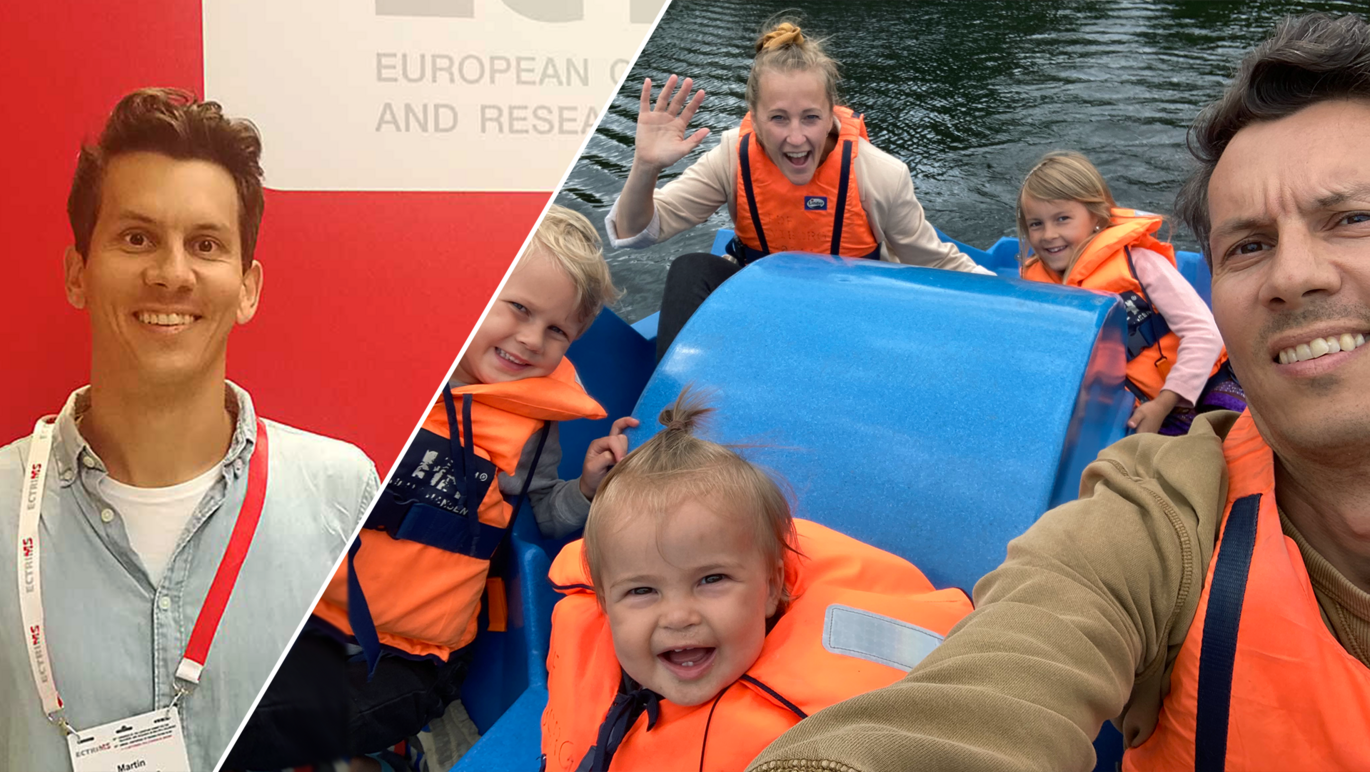Martin Langeskov Christensen: "The postdoc position was almost my last chance"
The road from PhD to professor is not a straight line – in fact, it’s full of career detours and family bumps. Every month, a researcher discusses how they navigate life as a member of academic staff at Health. Meet postdoc Martin Langeskov Christensen from the Department of Public Health.

About
- Name: Martin Langeskov Christensen
- Age: 37
- Title and affiliation: Postdoc at the Department of Public Health, Sports Science (two days a week) and researcher at the Department of Neurology at Viborg Regional Hospital (three days a week).
- Field of research: Exercise biology
- Place of residence: A house in Viborg
- Family circumstances: Married to Monika, who is nurse, and together they have three children aged 1, 5 and 6 years.
When family life and work life get in the way of each other. Every single day. I’ve got two jobs at two workplaces in two different cities. I’ve got three small children and a wife with rigid working hours. We constantly have logistical challenges, and they take up a lot of time in life.
But all is well. This is important to remember. When you just look up a little and zoom out, our problems are pretty trivial. We both have great jobs that we enjoy, we have fantastic children and a family that steps up and helps enormously.
Flexitime is crucial. My wife is a nurse and has to start work every day at 7.20 in Silkeborg, and she won’t be home again until 16:00 at the earliest. Therefore, I usually have to take and fetch the children. On the other hand, I can work in the evening when everyone is asleep and the house is quiet. Everyone understands that in some weeks I work 30 hours, while in others I can put in 45 hours, and I’m pleased with that arrangement.
I always prioritise a quick email reply when a student I’m supervising contacts me. My goal is 24 hours max. Not long ago, I myself was sitting on the other side of the table, and I know how much it means to be able to get in touch with your supervisor.
On the other hand, I always cut out review tasks for journals. It's a no brainer. I probably get an average of one peer-review invitation every two weeks. It's an important but far too time-consuming task if you do it properly, and you don't get anything for it. The insight is clearly useful, but you can always get that elsewhere.
The CV strategist in me sometimes has to swallow a bitter pill. Conferences, for example. Fitting them in can be a problem. But on the other hand that’s where you establish professional networks, and they look good on your CV. I don't actually experience any pressure from the outside, or that anyone expects me to attend conferences. The pressure probably comes mostly from myself.
The postdoc position was almost my last chance. My PhD degree wasn’t just given to me, and I've spent a total of two years as a research assistant. I’ve seen several close colleagues drop out because the job situation was too uncertain, and several good friends have got good, permanent jobs long before me. I myself had started to think in other directions outside the academic world when the postdoc position landed just before Christmas in 2019. It was a really good Christmas present.
My PhD supervisor has a vast network, and he generously invited me in. It’s largely thanks to him that I decided on a research career. I’m surrounded by good people and I’m part of good research groups who fully understand the art of balancing family life with university and research jobs. I have fun colleagues who can also help as professional sparring partners.
It stings a little when I hear about other people's periods of study abroad. I didn't have any time abroad during my PhD, and I've regretted that. My research project required me to stay in Denmark. I couldn't physically be away from the project, so I went on a research stay at Aarhus University Hospital instead. It annoys me that I didn’t get to set up my PhD project so that I could go away for just a short time.
I still dream of a period abroad. My wife and I regularly discuss the possibilities of traveling together so that I can have an academic stay and we can share an experience as a family. We both want to. After all, it doesn’t have to be for several years. Three to four months would also easily be enough.
My brain collapses if I don't exercise. Sport gives me a huge lift in life. I can turn off my brain and I’m completely absorbed in the moment when I go for a cycle ride, play padel tennis or join others in some other kind of sport. On days when I work at home, I often take a run during lunch break or after I’ve dropped off the kids.
Bureaucracy and GDPR rules kill academic spontaneity and suck away mental energy. I spend an insane amount of time and thought on legal aspects, GDPR and collaboration agreements. Time that could be spent on research instead. You almost have to set aside an extra year to understand and complete all the bureaucratic work outside an actual research project. I feel a growing frustration, and I wish there were clearer, better defined processes for researchers who want to collaborate with others.
My family has no tradition of long academic education. They’re immensely proud of me, and I’m lucky enough to have huge support and understanding from home. This is my dream job, and I’ll enjoy it for as long as it lasts.